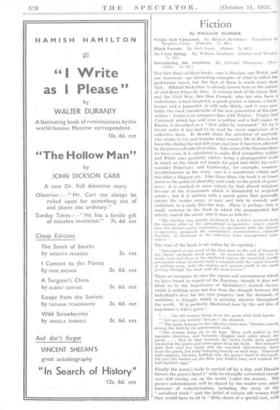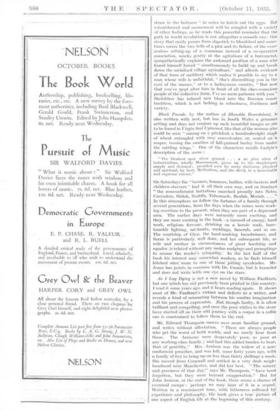Fiction
By WILLIAM PLOMER
Virgin Soil Upturned. By Mikhail Sholokhov. Translated by Stephen Garry. (Putnam. 7s. 6d.) Black Parade. By Jack Jones. (Faber. 7s. fid.) Introducing the Arnisons. By Edward Thompson. (Mae-
rnillun. 7s. lid. )
THE first three of these books—one is Russian, one Welsh, and one American—are interesting examples of what is called the proletarian novel, but the first of them is much more than that. Mikhail Sholokhov is already known here as the author of And Quiet Flows the Don. A veteran both of the Great Wat and the Civil War, this Don Cossack, who has also been a statistician, a food inspector, a goods porter, a mason, a book-
keeper and a journalist, is still only thirty, and is very pro- bably the most considerable of the new generation of Russian
writers : Gorki even compares him with Tolstoi. Virgin SO Upturned, which has sold over a million and a half copies in Russia, is described as a " best seller by command," for by a
Soviet order it has had to be read by every supervisor of a collective farm. It should claim the attention of anybody
who wants to try and imagine what country life in Russia has been like during the last few years and how it has been affected by the process of collectivisation. Like some of the Russian films we have seen, it is calculated to make Red sympathies redder and White ones probably whiter, being a propagandist work in which on the whole red stands for good and white for evil consider Polovtsiev and Lyatievsky, for example, counter revolutionaries in the story—one is a murderous villain and the other a flippant sot. Like those lilms, the book is at times naive to the point of absurdity and crude to the point of grosS- ness ; it is marked to some extent by that almost religious fervour of the Communist which is distasteful to sceptical minds ; but it is written with a poetic gusto that general/ .carries the reader away, is racy and rich in comedy and exuberant in a truly Russian way. There is perhaps only a single sentence in the book in which the propagandist has utterly routed the artist, and it runs as follows : " His election was greatly facilitated by a letter received from the district oleo of the agricultural co-operative, which stated that the district party committee, in agreement with the district co-operative, proposed the committee's representative, comrade Davidov, as chairman of the collective farm management com- mittee."
The tone of the book is set rather by its opening :
" Enveloped in the scent of the first thaw at the end of January, the cherry orchards smell good. At noontide, when the sun is warm, here and there in the sheltered corners the mournful, hard@ perceptible odour of cherry-bark is mingled with the vapid rawneSs of melting snow, with the mighty and ancient smell of the earth peering through the snow and the dead leaves."
There we recognise at once the vigour and sensuousness which we have learnt to expect of the Russians, though it does not blind us to the importance of Sholokhov's central theme, which is nothing more nor less than the struggle between the individual's love for his own property and the demands of socialism, a struggle which is growing intenser throughout the world. It is perfectly illustrated here by the sad fate of Lapshinov's wife's goose :
" . . . the old woman clung on to the goose with both hands.
" Lot go, you wretch ! Let go 1 she shouted. • " ' The goose belongs to the collective farm now,' Diemka roared, seizing the bird by its outstretched neck.
" The woman hung on to its legs. They each pulled in the opposite direction, and furiously dragged each other about the porch. . . . But at that moment the bird's feeble neck quietly cracked at the joints and came apart from the body. The woman's skirt flew over her head, and she tumbled thunderously down from the porch, her body bumping heavily on each step. Groaning with surprise, Diemka, holding only the goose's head in his hands, fell into the basket on the floor just behind him, and crushed the half-hatched eggs."
Finally the goose's body is carried off by a dog, and Diemka throws the goose's head (" with its eternally astonished orange eyes still staring out on the world ") after the woman. Thile goose's astonishment will be shared by the reader over other humours of collectivisation, including the story of tiip " socialised fowls " and the belief of certain old women that they would have to sit in " little chairs of a special sort, wall
•
straw in the bottoms " in order to hatch out the eggs. But astonishment and amusement will be mingled with a variety of other feelings, as he reads this powerful reminder that the path to world revolution is not altogether a smooth one ; this story that easily passes from slapstick to bloodshed and some- times mixes the two 'tells of a plot and its failure, of the over- - „.zealous setthig-up' of a commune instead of a co-operative association, mocks gently at the agitations of a bureaucrat, sympathetically explains the awkward position of a man Who found himself forced " simultaneously to build up and break down the socialised village agriculture," and affords evidence of that form of snobbery which makes it possible to say to a man whose wife is unfaithful, " She's discrediting you in the eyel of the masses," or to a lachrymose cocotte, " But no" that you've _yvept after him in front of all the elass-consciouS peoPle of the collective farm, I've no more patience with you." Sholokhov has infused new blood into the Russian comic tradition, which is not larking in robustness, liveliness and variety.
Black Parade, by the author of .Rhondda Roundabout, is also written with zest, but has in South Wales a griminer setting and does not conjure up such beautiful images as 'are .,to be found in Virgin Soil Upturned, like that of the woman #ho could be seen "raising on a pitchfork a hundredweight sto,?1‘ of wheat entangled with rosy convolvulus, or, seated on reaper, tossing the swathes of 'hill-grained barley from under the rattling wings." One of the characters recalls Carlyle'S description of the scene : " The bleakest spot above ground . . . a ne. plus ultra of industrialism,. wholly ,Mammonish, given up to the shopkeeper, supply and demand ; presided over by sooty darkness, physical and spirituali,by beer; Methodism, and the devil, to a lamentable and supreme extent."
On Saturdays'he "boozer's, bouncers, bullies; wife-beaters' and children-starvers " had it all their own way, and on Sundays "the nonconformist battalions marched proudly into Nebo, Caersalem, Shiloh, Noddfa, Tabernacle, Beulah, Morlah. ."
In this atmosphere we follow the, fortunes of a family. through several generations,' from the days when the mines were work- ing overtime to the present, when they are part of a depressed area, The earlier days were naturally more exciting, and they are more exciting in the book—a turmoil of energy,-hard work, religious fervour, drinking on a heroic scale, bare- knuckle fighting, rat-hunts, weddings, funerals, and so on. The courtship of Glyn, the hard-working breadwinner, and Saran is particularly well done, and her subsequent life, as wife and mother in circumstances, of .great hardship and squalor; iifielated without any Undue nudgings-and promptings to arouse_ the .reader's syMpathy." tri the last half of the book his interest may somewhat ,weaken, as he finds himself hitched ciliCi:metre .to one of those jolting cavalcades. Mr. Jones has points in common with Dr. Gronin,-bitt is homelier and does .ricit write with one eye•on the stars. • As 1 ,may-Dying is not a new novel by :William Faulkner, but one, which has not preViouSlYbeen printed in this country, I read it some years ago, and it bears reading again. It shows most of Mr:-Tanlkner's virtues and defects -as a- writer, and reveals' a -kind 'of -misrnating between- his sombre imagination and his powers. of expression. ...But_though.faulty,_ it is often 'brilliant and compelling, and once the poor whites in the story have started off on their odd journey with a corpse in a coffin one is constrained to follow them to the end.
Mr. Edward ThompSon -moves over -more • familiar ground} and writes without affectation. " There arc always people who get the worst of both worlds, and we rarely hear from] these. The Arnisons were desperately poor, as poor as any working-class family ; and had this added burden to bear; that of gentility." Mrs. Arnison was the widow of a -non- :conformist preacher, and was left, some forty years ago, with a family of five to bring up, on less than thirty shillings a week: She moved from Cornwall and settled in a very drab neigh bourhood near' Manchester, and did her best. " The misery and grosiness of that day;" says Mr: Thompson, ' have beent forgotten, but they were -beyond exaggeration.") . But fo John••Arriison, at the end of the book, there seems a chance o eventual escape : 'perhaps we may hear of it in a sequel. Written in a reminiscent tone, with bitterness softened b expeirenee and 'PhiloiopliY., the book gives a 'true picture oft One aspect of English life at 'the beginning of this century.































































 Previous page
Previous page